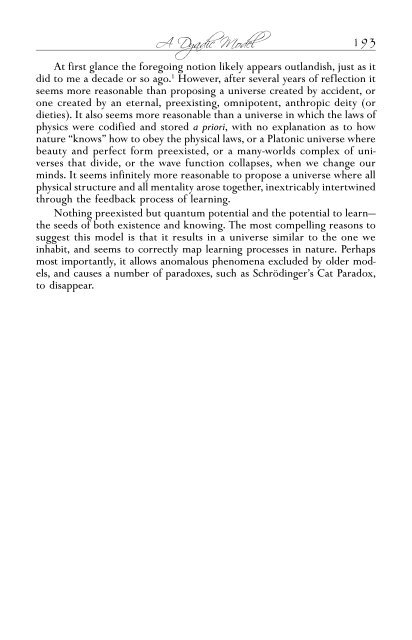edgar-mitchell
edgar-mitchell
edgar-mitchell
You also want an ePaper? Increase the reach of your titles
YUMPU automatically turns print PDFs into web optimized ePapers that Google loves.
Down and In 97<br />
Of the last 50,000 years, there has been a written language for only<br />
the past 5,000. We humans have only been meaningfully self-analytical for<br />
the past 3,000. Just a few centuries ago Gutenberg made the first printing<br />
press, and not until the last century could man transmit a message through<br />
electrical means. The 20th century will be remembered for all time for<br />
three of the most remarkable human accomplishments: splitting the atom,<br />
space travel, and the advent of the computer. We are now simultaneously<br />
living in the Atomic Age, the Space Age, the Information Age, and the<br />
Computer Age. All four are, of course, unprecedented in human history.<br />
But more importantly, the time period between doubling the number<br />
of new innovations and major developments has been reduced to just a<br />
few years, and doubling the amount of information available has been<br />
reduced to just a few months. Indeed, the periods for doubling the human<br />
population and the speed of transportation has been reduced to less than a<br />
human generation in my own lifetime.<br />
What is most startling when considering this history is the extraordinary<br />
brevity of the history itself. The acceleration of change and the effect<br />
humans have had on the face of the planet provides common everyday<br />
evidence that human intentionality is a powerful force and that evolution<br />
is alive and well. It is also increasingly under intentional human control. This<br />
evidence begs the immense and inevitable questions: where was intentionality<br />
before the human period, and what lies in the offing for the next<br />
centuries What will our civilization be like in 100 years, in 200 years, 500<br />
years Will humankind recognize the destructive effect it is having on our<br />
planet, and change its thinking and its actions toward a more sustainable<br />
future As H.G. Wells once said, human history appears to be becoming<br />
more and more a race between education and catastrophe. Of course the<br />
clock will one day run out on these threats, either by social catastrophe, or<br />
through disciplined human action, though only the latter should be acceptable.<br />
Ultimately the promise of our technologies lies in our eventual<br />
escape from a dying planet.<br />
Though the suggestion seems amazing even now, it would doubtless<br />
have appeared unfathomable to the Renaissance men of the 15th century<br />
that their progeny would one day surround the planet with a network of<br />
artificial satellites in order to photograph the mother planet, communicate<br />
at the speed of light, and spy on one another. The atom was still<br />
centuries away from being definitively revealed. What we take for granted<br />
in our daily lives would be considered some kind of legerdemain 500 years<br />
ago, punishable by burning at the stake. Had today’s scientists been alive<br />
then, they would have been condemned as sorcerers and magicians by the<br />
Church and its laity—much as were Copernicus, Galileo, and Bruno. Likewise,<br />
what seems implausible now will certainly be routine in the coming centuries.


